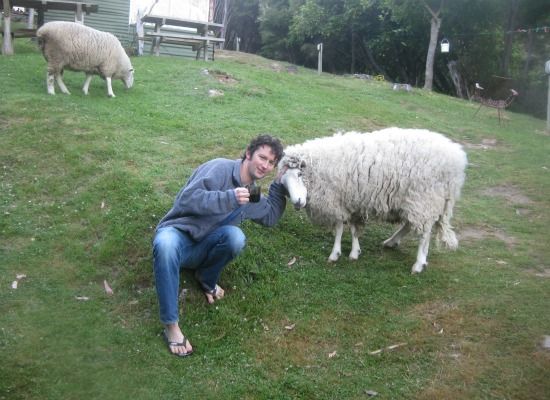Into New Zealand’s Strange Waters and Prehistoric Forests
The absence of native mammals, aside from bats and pinnipeds, gives the impression that New Zealand is still in the age of dinosaurs
/https://tf-cmsv2-smithsonianmag-media.s3.amazonaws.com/filer/56/f8/56f8817f-890a-4793-a368-36b15d469b6b/abaloneinfogbig.jpg)
At least 48 earthquakes rattled Christchurch on January 2. People here are losing track as the ground keeps shaking and fears of more big temblors have them walking on their tiptoes. In the city center, the devastation from last February’s 6.3 quake remains plain, as condemned buildings stare bleakly over the nervous city. And with the memories of that deadly day still vivid, two more large earthquakes struck Christchurch on December 23, and on the second day of this year the shaking hardly stopped at all.
“We haven’t slept much in the past 24 hours,” said a weary-eyed cashier at the airport currency exchange office as she handed me a few bills and tried to produce a smile.
But for my brother, my parents and me, January 2, 2012 was a day of no consequence. In fact, it never happened. Somewhere between leaving San Francisco on the first, flying west and crossing the International Dateline, January 2 vanished; we arrived on the third.
We rented a car and left the city immediately—not that we were following the advice of blogger Bridget Gleeson, who recently listed Christchurch as one of 11 places in the world not to visit. No, Andrew and I simply wanted to get checked in to our hostel, put on our wetsuits and get in the water with time to catch dinner’s main course. So we drove east in our Subaru wagon, hugging the left side of the road as we wound outward onto the Banks Peninsula, toward a small seaside town called Akaroa. From here the road turned sharply uphill for the final miles and ended at the Onuku Farm Hostel, a green and grubby little cluster of shacks, huts, outhouses and hammocks, all clinging to a 30-percent slope about 700 feet above sea level.

Andrew and I grabbed our wetsuits, spears and snorkeling gear and scrambled down the mountainside. The woods were thick with ferns, eucalyptus and strange native trees that doubled over periodically when enormous green New Zealand pigeons settled upon their branches. Sheep grazed abundantly, making for scenery like Scotland’s—yet the green hills gave me a bizarre feeling that, at any moment, a pterodactyl or tyrannosaur might suddenly appear through the treetops. For there is a prehistoric strangeness in the wilds of New Zealand, and I think I have pinned it down: It’s the absence of native mammals, except bats and pinnipeds, which gives the impression that one is walking in the age of dinosaurs.
At the water’s edge, we suited up and jumped in. It took a moment to adjust to the shock of the cold before we could begin diving—and we had to hunt for our paua fast, as we wouldn’t last long in this frigid sea. The water was murky, and at the bottom we sifted through the kelp and vegetation, looking for the small abalone clamped to the rocks. The larger ones we pried off using butter knives, and we filled our bags. We looked for fish, too; Andrew saw a large trevally dash past him in the glacial green shadows, and large wrasse slipped through the cloudy water, in and around kelp fronds like phantoms haunting a forest. But we speared none and, after 30 minutes, crawled from the water a few degrees from hypothermic. We shivered ourselves warm again in the summer sun before hiking back up the mountainside to the hostel. Paua require some diligent preparation, and we spent an hour in the open-air kitchen clubbing the snails’ feet with beer bottles to tenderize them for the frying pan. We began cooking at 8:00, when the sun was still high, and it only got fully dark by 10:00. By then we’d packed away a feast of paua, local wine and brown rice. The next night we ate nine paua, and by the time dinner was done we had all decided we could go weeks without any more slippery piles of sautéed sea snail.

Today, we drove for hours south and west on the coastal Highway 1, a bleak route through suburbs, sprawl, malls and endless offerings of gas and fast food. We saw the ocean just once on our left side, though we were reminded that, not far away, New Zealand’s famed natural beauty glimmered and shined. On the western horizon ran a range of jagged mountain peaks that sawed at the ceiling of clouds like shark teeth—the Southern Alps. We had a few glimpses of Mount Cook, the 12,000-foot peak that bears snow all year and has taken the lives of scores of climbers. We drove through Ashburton, Timaru and Waimate, turned upstream along the Waitaki River, and finally stopped in the river town of Kurow, where a trailer park was all we could find. The wind was howling almost too hard to cast flies, and it began to rain. I gave the river a few casts, then turned my back, but Andrew walked and waded for four hours. He returned an hour before dark and said he saw several large brown trout and received a strike from one, which broke his line. He plans to skip coffee and be on the water again before sunrise. Such is the power of the brown trout, New Zealand’s favorite invasive species.
Next week: A New Zealand fishing report that includes fish.
/https://tf-cmsv2-smithsonianmag-media.s3.amazonaws.com/accounts/headshot/Off-Road-alastair-bland-240.jpg)
/https://tf-cmsv2-smithsonianmag-media.s3.amazonaws.com/accounts/headshot/Off-Road-alastair-bland-240.jpg)